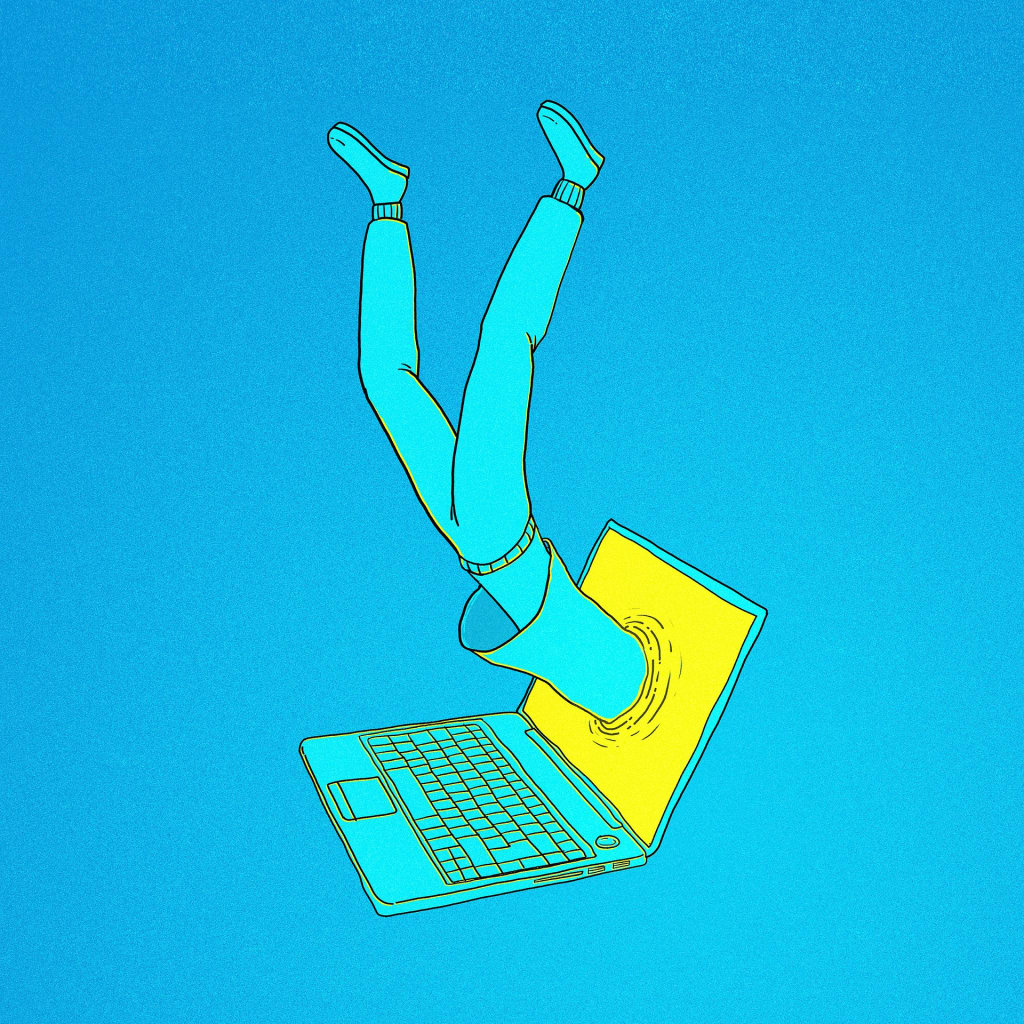
Cell phones have evolved into such strong and diverse instruments that they have become practically vital to many individuals.
When you can't find your phone, it's easy to feel like you're the one who's lost. So, how can you tell if your phone addiction is merely a 21st-century cultural fad or a true, life-altering addiction?
Let's look at what current research has to offer to find out the solution. We'll also look at the signs and symptoms of phone addiction, as well as the consequences and how to break free from your phone's grip on your life.
Is there such a thing as cell phone addiction?
According to the Pew Research Center, 81 percent of Americans now own cellphones, up from 35 percent in 2011. In addition, Google Trends shows that searches for "mobile phone addiction" have increased over the last five years.
And pathological phone usage has spawned a slew of new terms, including:
• The dread of being without your phone is known as nomophobia.
• Textaphrenia is the dread of not being able to send or receive text messages.
• phantom vibes phantom vibrations phantom vibrations when you get the impression that your phone is informing you when it isn't.
Excessive cell phone use is undeniably a problem for a large number of people.
However, medical and mental health specialists disagree regarding whether excessive mobile phone use is genuinely an addiction or the outcome of a problem with impulse control.
Many medical professionals are hesitant to use the term "addiction" to describe anything other than chronic substance abuse.
However, one behavioral addiction is recognized by the Diagnostic and Statistical Manual of Mental Illnesses (the manual used in the medical profession to diagnose mental disorders).
It's worth mentioning that mobile phone addiction and behavioral addictions like compulsive gambling have some striking parallels. The following are some of the similarities:
a lack of control over one's actions
perseverance, or a true struggle to control the conduct
tolerance, the desire to repeat the activity in order to get the same result
serious negative outcomes as a result of the action
When the habit isn't exercised, it might lead to withdrawal or emotions of irritation and anxiety.
relapse, or resuming a habit after a time of abstinence
Dopamine and the brain
Another parallel between behavioral addiction and cell phone addiction is the activation of a chemical in the brain that encourages the obsessive behavior.
When you're in a rewarding circumstance, your brain includes multiple pathways that send dopamine, a feel-good chemical. Dopamine is released in many people as a result of social engagement.
Because so many people use their phones for social connection, they've grown accustomed to checking them frequently for the dopamine rush that comes from connecting with others on social media or through another app.
App developers rely on this desire to keep you monitoring your phone. Some applications even withhold and release social stimuli like "likes" and "comments," causing us to get them in a random rhythm. We check our phones more frequently when we can't foresee the trend. This cycle may lead to a tipping point, where your phone stops being something you love and becomes something you have to use.
Who is the most vulnerable?
What academics do agree on is that teens are more prone than other age groups to experience addiction-like symptoms as a result of their cell phone use.
According to studies conducted by Trusted Source, cell phone usage peaks during adolescence and then steadily drops subsequently.
Excessive mobile phone use is so frequent among teenagers that 33% of 13-year-olds never switch their phones off, day or night. And the younger an adolescent is when they get a phone, the more likely they are to develop harmful phone habits.
Girls may acquire dependent usage behaviors as phones become crucial instruments of social engagement, but boys are more likely to use phones in dangerous situations.
Who else is in danger?
• a critique
• According to the existing research, a number of personality characteristics and circumstances have been linked to problematic mobile phone usage.
• Among these personality qualities are:
• low self-confidence
• Being overly extroverted can lead to poor impulse control, anxiety, and despair.
It's not always obvious if issues with mobile phone abuse cause these disorders, or whether the conditions themselves make people more sensitive to overuse, according to researchers.
Phone Addiction Signs and Symptoms
So, how can you know whether you have a smartphone overuse problem?
The following are some of the telling signs:
• When you're alone or bored, you grab for your phone.
• You check your phone many times during the night.
• When you can't reach your phone, you become frightened, agitated, or irritable.
• You were involved in an accident or sustained an injury as a result of your phone usage.
• You're spending an increasing amount of time on your phone.
• When you use your phone, it affects your job performance, academics, and relationships.
• People close to you are concerned about your phone usage habits.
• When you try to cut back on your usage, you soon relapse.
What are the negative consequences of cell phone addiction?
Maintaining obsessive behavior, even when it has significant negative effects, is one of the characteristics of any addiction.
Take, for instance, the dangers of texting while driving. Texting while driving is a triple danger, according to the Centers for Disease Control and Prevention Trusted Source, since it leads you to:
• take your gaze away from the road
• take your hands off the steering wheel
• your attention away from the road
Every day, nine individuals are killed by this type of distraction. It also causes harm to a large number of people.
The disadvantages of using a mobile phone while driving is well-known, yet many individuals disregard the risk in exchange for the brief sense of closeness provided by a phone.
Other ramifications
Overuse of cell phones has been linked to the following symptoms, according to Trusted Source research:
• anxiety \depression
• Relationship issues caused by sleep deprivation and insomnia
• mediocre academic or professional performance
That list ignores the numerous ways in which cell phone addictions have a subtle impact on your life.
According to one research
Phone notifications, according to Trusted Source, "seriously impair" your ability to focus on crucial job-related tasks, even if you don't engage with your phone.
How to Get Rid of Your Addiction
It might be time to make some adjustments if your phone habits are interfering with your health, relationships, or duties.
The good news is that you can take efforts to adjust how you engage with your phone in order to reduce the negative effects on your life.
To begin, determine whether there are any underlying concerns.
People who use their phones excessively, according to Trusted Source, may be trying to avoid dealing with difficulties in their life that are too tough or hard to settle.
So, one of the first things to examine is whether you're dealing with something more serious. Resolving the underlying problem may be the key to alleviating your anxiety.
Knowing what's really troubling you might help you stop texting, buying, pinning, tweeting, swiping, or posting.
Consider cognitive behavioral therapy (CBT).
This method to treatment can help you understand the connections between your ideas, behaviors, and emotions. It may be a very successful sort of treatment for changing particular patterns of behavior.
CBT appears to be successful in balancing alterations in brain chemistry related with mobile phone addiction, according to at least one small research.
If you believe this sort of treatment may benefit you, speak with your primary care physician about finding a therapist.
Take a look at these other useful tips.
Remove time-consuming applications from your phone and use a device you don't have with you all day to access them.
To disable push notifications and other obtrusive alerts, change your settings.
set your screen to grayscale to prevent it from waking you up in the middle of the night.
Put some barriers in place to make you think about what you're doing when you're on your phone. Create lock screen questions like "Why now?" and "What for?" for example.
Keep your phone hidden from view. You should charge your phone somewhere else than your bedroom.
Develop soul-satisfying hobbies. Replace video games and social networking applications with hands-on, real-world activities such as getting together with friends, making music or art, or volunteering.
Adopt an attitude of progress. Relapses, modifications, and withdrawal symptoms are all part of the process of becoming more responsible with your phone. It's unlikely that you'll get it properly the first time. Expect some setbacks and take lessons from each one.
When should you seek assistance?
It's never a bad idea to ask for help when you're dealing with a problem you're worried about or don't feel you have control over.
If you believe you are suffering from cell phone addiction, you will want to take the needed steps to change this right away. Your relationships could go downhill if you do not. Plus, you will feel much better the less you are on your phone. You will have time for hobbies and things that you enjoy again!
It's a good idea to get treatment if you're detecting signs of addiction or dependency, or if people in your life are commenting on how much time you spend on your phone.
About the Creator
chamoo
Experienced blog writer with a passion for crafting impactful content. Skilled in a variety of niches and committed to delivering high-quality, SEO-friendly writing that engages readers and achieves client goals.






Comments
There are no comments for this story
Be the first to respond and start the conversation.